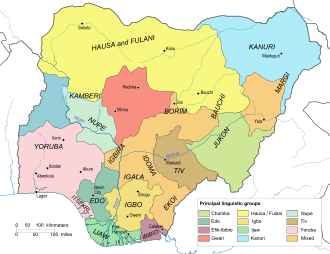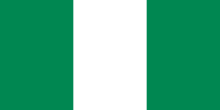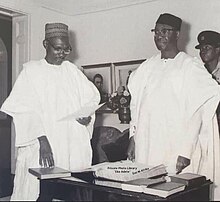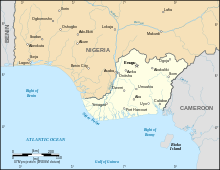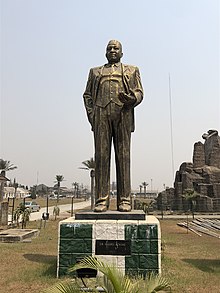Nnamdi Azikiwe
[18] While at Wesley Boys High school he excelled in his studies and gifted a book titled "from Log Cabin to the White House", a biography of James A. Garfield, former president of the United States, who rose from grass to grace.
To fund his living expenses and tuition, he worked a number of menial jobs before enrolling in Howard University in Washington, D.C. in 1927 to obtain a bachelor's degree in political science.
Nnamdi founded Zik's Athletic Club (ZAC) which would open its doors to sportsmen and women of all races, nationalities, tribes, and classes of Nigeria.
[46] Finally, after years of struggle, in 1959 the last British official left the NFA, and on 22 August 1960, a few weeks prior to its formal independence, Nigeria joined the world football body of FIFA.
Azikiwe, hearing of the unruly event, wrote an article of condemnation titled ‘Murdering women in Nigeria’ while still studying in the United States in 1930 and a letter which he addressed to the then Pan-Africanist civil rights activist, WEB du bois.
[28] Yuri Smertin described his writing as, "passionately denunciatory articles and public statements which censured the existing colonial order: the restrictions on the African's right to express their opinions, and racial discrimination".
On his conviction, Zik declared, "if because I am an instrument of destiny through which imperialism in West Africa is to be challenged and liquidated, and if in this mission I am compelled to pay the supreme penalty, then there is no need for me to quake or to quiver.
Other publications were the Southern Nigeria Defender from Warri (later Ibadan), the Eastern Guardian (founded in 1940 and published in Port Harcourt), and the Nigerian Spokesman in Onitsha.
[80] As a result of Azikiwe's support for a general strike in June 1945 and his attacks on the colonial government, publication of the West African Pilot was suspended on 8 July of that year.
[86] The skeptics were primarily Yoruba politicians from the Nigerian Youth Movement, creating a rift between the factions and a press war between Azikiwe's Pilot and the NYM's Daily Service.
A non violent youth movement – led by Kolawole Balogun, Raji Abdallah, Osita Agwuna, M. C. K. Ajuluchukwu and Abiodun Aloba – was established in 1946 to defend Azikiwe's life and his ideals of self-government.
Abdallah and Osita Agwuna (his deputy) had just formed the Anti-Colour Bar Movement (ACBM) in Kano, which was opposed to racial discrimination segregating whites and blacks in Nigeria.
"Today, I, Habibu Raji Abdallah, by the grace of God, President General of the Zikist Movement and Field Secretary of the NCNC, do hereby, declare myself a free and independent citizen of Nigeria.
[90][91][92] His famous phrases travelled beyond the borders of Nigeria and was adopted by Kwame Nkrumah's Convention Peoples Party (CPP) of the Gold Coast (now Ghana).
[74] NCNC politicians opposed unilateral decisions made by Arthur Richards and a constitutional provision allowing only four elected African members; the rest would be nominated candidates.
Azikiwe met Eleanor Roosevelt at Hyde Park, and spoke about the "emancipation of Nigeria from political thralldom, economic insecurity and social disabilities".
[97] The UK delegation included Azikiwe, Funmilayo Ransome-Kuti, Zanna Dipcharima, Abubakar Olorunimbe, P. M. Kale, Adeleke Adedoyin and Nyong Essien.
[98][99] They visited the Fabian Society's Colonial Bureau, the Labor Imperial Committee and the West African Students' Union to raise awareness of its proposals for amendments to the 1922 constitution.
Nnamdi Azikiwe used the occasion, at the eastern house of assembly, to give a speech honoring Prime Minister Nkrumah and recalled how Kwame has been dedicated to the African course.
The coalition government of NCNC and NPC was in power when Nigeria attained independence in 1960 with Sir Tafawa Balewa as Prime Minister and Dr. Nnamdi Azikiwe as Senate President.
Nigeria's first indigenous Executive Cabinet of Tafawa Balewa included; M Johnson, Bukar Dipcharima, Ayo Rosiji, Aja Wachukwu, Kolawole Balogun, and Victor Mukete (Cameroon), Samuel Akintola, Raymond Njoku, Alhaji Ribadu, Kingsley O. Mbadiwe, Festus Okotie-Eboh, and Allaji Inua Wada.
Each step of our constitutional advance has been purposefully and peacefully planned with full and open consultation, not only between representatives of all the various interests in Nigeria but in harmonious cooperation with the administering power which has today relinquished its authority.
Azikiwe's inauguration in November 1960, witnessed some of his colleagues in the Black Atlantic, some of them which includes Martin Luther King Jr, Langston Hughes, Nina Simone, Dr. Horace Mann Bond, Ralph Bunche, W.E.B.
Prime Minister Tafawa Balewa proposed an amendment of the 1960 independence constitution to transform Azikiwe from Governor-General and redesignate his title as a ceremonial President.
[124] 1964 Crisis and Coup Nigerian Daily Express reported on 3 March 1964, "On attainment of Independence in 1960, our first attempt to ascertain the population of Nigeria was the census exercise in 1962.
The elections were marred by widespread boycotts, rigging, intimidation, arson and violence which left Azikiwe so aghast that he refused to call Prime Minister Balewa to form a new government.
Colonel Odumegwu Ojukwu, military governor of the Eastern Region, declared the independence of the Republic of Biafra in southern Nigeria on 30 May 1967 after the federal government did not honor the Aburi Accord.
His influence extended throughout British colonial territories and he was the motivating force of some African leaders like Kwame Nkrumah, Julius Nyerere, Dauda Jawara, Kenneth Kaunda and Milton Obote among others.
Azikiwe founded a media outfit called Zik Group, under which he established and edited West African Pilot, which was referred to as "a fire-eating and aggressive nationalist paper of the highest order."
[131] Chief Azikiwe was installed as the Owelle-Osowa-Anya of Onitsha in 1972, making him a first-rank hereditary red cap nobleman (Ndichie Ume) in the Igbo branch of the Nigerian chieftaincy system.
